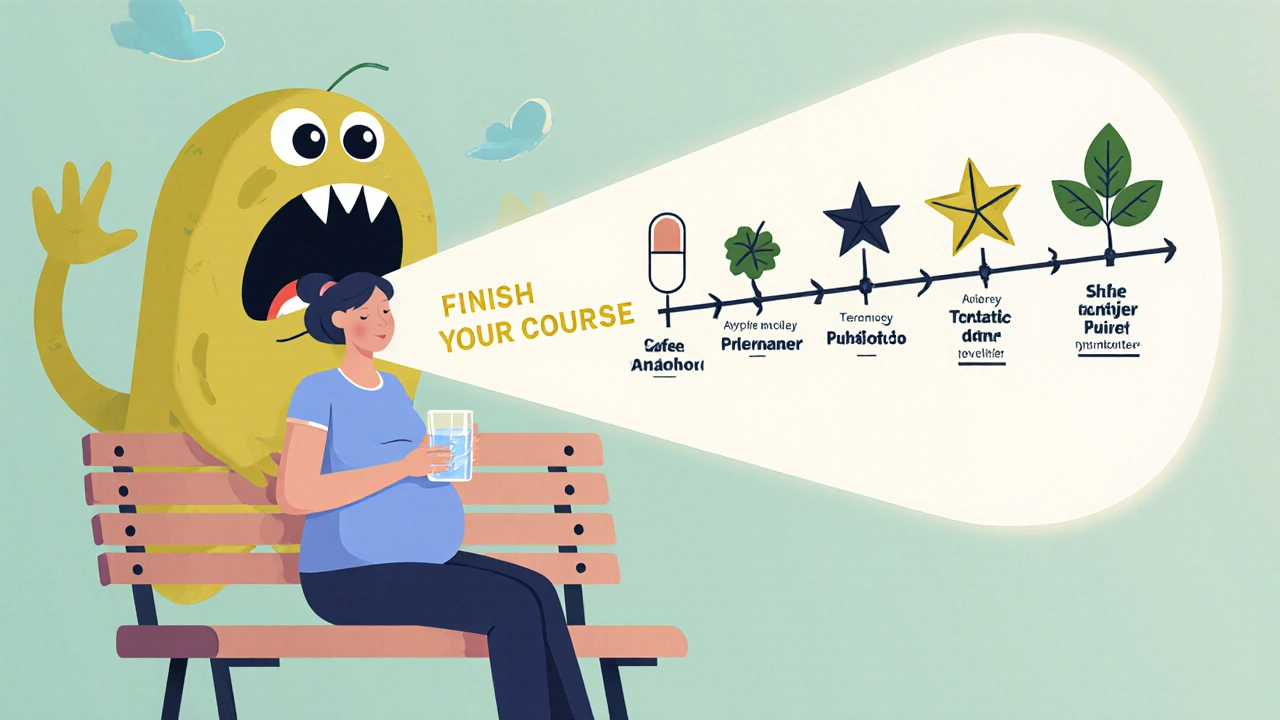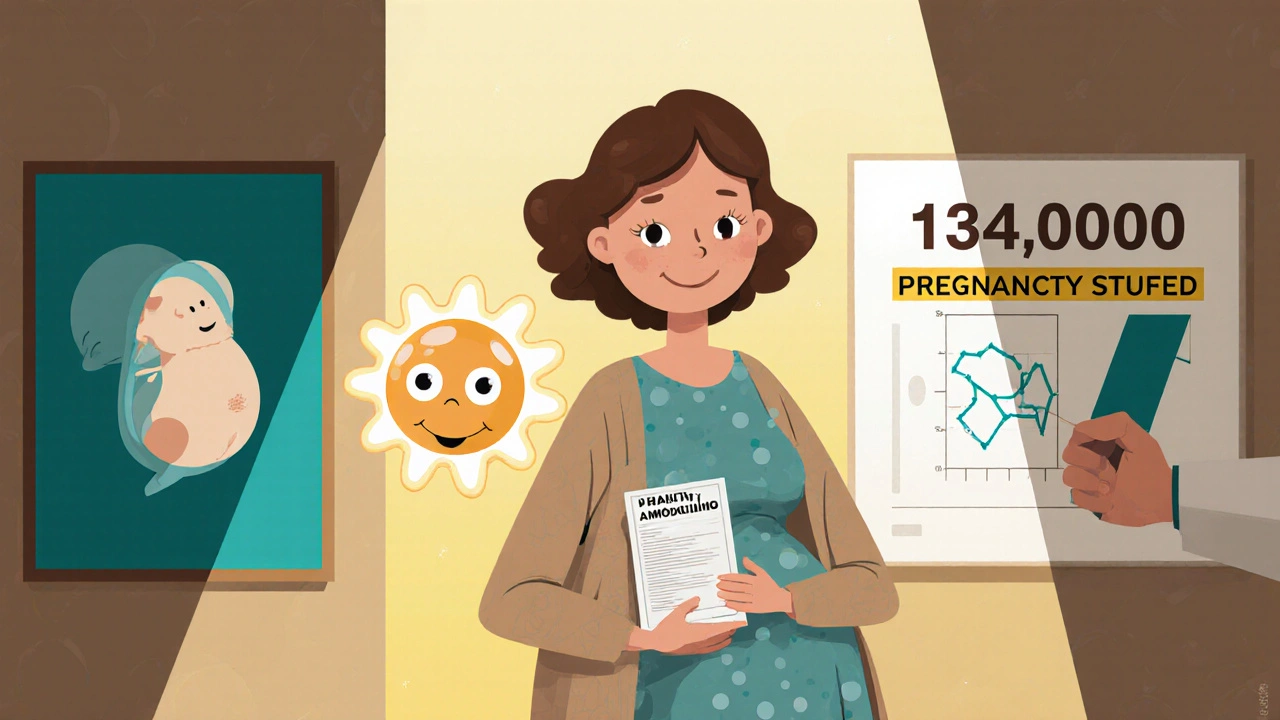Pregnancy Antibiotic Safety Checker
Check Antibiotic Safety
When you're pregnant, even a simple infection can feel overwhelming. You don't want to risk your baby’s health, but you also can't ignore a bad urinary tract infection, strep throat, or bacterial vaginosis. The good news? Many antibiotics are safe to use during pregnancy - if you know which ones and how to use them properly. The key isn’t avoiding antibiotics altogether, but choosing the right one at the right time.
Which Antibiotics Are Actually Safe During Pregnancy?
Not all antibiotics are created equal when you're expecting. The safest options have been studied in thousands of pregnancies and show no clear link to birth defects. Penicillins like amoxicillin and ampicillin are the gold standard. They cross the placenta, but decades of data show they don’t increase the risk of major malformations. In fact, amoxicillin is the go-to for Group B Strep during labor and for most common infections like sinusitis or ear infections. Studies tracking over 134,000 pregnancies found no increased risk of birth defects with penicillins. Cephalosporins like cephalexin and cefaclor are also considered safe and are often used if you’re allergic to penicillin. They work similarly and have the same low-risk profile. For dental infections or bacterial vaginosis, clindamycin is commonly prescribed. It reaches the fetus at about 30-40% of maternal levels, but no consistent evidence links it to harm. For urinary tract infections (UTIs), which affect nearly half of all pregnant women, nitrofurantoin (Macrobid) is preferred - but only after the first trimester. While there’s a small increased risk of cleft lip if taken early on (about 2.4% absolute increase), studies show no major risks later in pregnancy. It doesn’t cross the placenta much, making it ideal for bladder infections in the second and third trimesters.Antibiotics to Avoid During Pregnancy
Some antibiotics are outright dangerous. Tetracyclines - including doxycycline and minocycline - are a hard no after the fifth week of pregnancy. They bind to developing bones and teeth, causing permanent gray or yellow-brown staining in your baby’s teeth. They can also slow down bone growth. These are often prescribed for acne or Lyme disease, but if you're pregnant, your doctor will switch you to something else. Sulfonamides like Bactrim or Septra carry a higher risk in the first trimester. One study found a 2.6-fold increase in neural tube defects when taken early on. They’re sometimes used later in pregnancy if no alternatives exist, but not as a first choice. Aminoglycosides like gentamicin and tobramycin are used for serious infections, but they can damage your baby’s hearing. These are reserved for life-threatening cases like sepsis, and even then, doctors monitor blood levels closely to keep doses as low as possible. And then there’s metronidazole (Flagyl). It’s tricky. Animal studies at very high doses raised red flags, so it’s avoided in the first trimester. But for bacterial vaginosis or trichomoniasis in the second and third trimesters, it’s considered safe - and often necessary. Topical gels are even safer, with no systemic absorption.What Side Effects Should You Watch For?
Even safe antibiotics can cause uncomfortable side effects. The most common? Upset stomach. About 15-20% of people taking amoxicillin feel nauseous. Diarrhea happens in 5-25% of cases, depending on the antibiotic. It’s usually mild, but if it lasts more than 48 hours after finishing the course, it could be Clostridioides difficile (C. diff) - a serious gut infection that needs immediate treatment. Here’s what helps:- Take penicillins with food to reduce nausea.
- Stay hydrated - especially if you’re dealing with a UTI.
- Consider a probiotic (like Lactobacillus) to help maintain gut balance, though evidence is mixed.
- Don’t stop the antibiotic just because you feel better. Stopping early increases the risk of the infection coming back - and could lead to antibiotic resistance.

Why Counseling Matters More Than You Think
Many women stop taking antibiotics because they’re scared of side effects or think the infection is gone. But that’s dangerous. Untreated UTIs can lead to kidney infections, which raise your risk of preterm birth by 50-70%. Untreated bacterial vaginosis increases the chance of early labor and low birth weight. Good counseling changes outcomes. A 2021 study of over 1,200 pregnant women showed that when doctors clearly explained:- Why the antibiotic was needed,
- What side effects to expect and when,
- Why finishing the full course matters,
Allergies Are Often Misunderstood
Lots of people say they’re allergic to penicillin. But studies show that 90% of those people aren’t truly allergic. Maybe they had a rash as a kid, or a family member was allergic, or they got sick while taking it and blamed the drug. A real penicillin allergy causes hives, swelling, or trouble breathing - not just an upset stomach. If you think you’re allergic, ask your doctor about getting tested. It matters because if you’re incorrectly labeled as allergic, you might get a less safe or more expensive antibiotic instead of amoxicillin. That’s especially risky during pregnancy, where alternatives may carry higher risks.
What’s New in 2025?
The field is evolving. In January 2024, the NIH launched the Antimicrobial Resistance in Pregnancy (AMRIP) initiative - a $12.5 million project tracking 15,000 pregnancies exposed to antibiotics. This is the first large-scale effort to study long-term outcomes in babies exposed in utero, especially in the third trimester. The FDA is also pushing drugmakers to include pregnant women in clinical trials - something that was rare for decades. That means we’ll soon have better data on newer antibiotics like tedizolid and delafloxacin, which currently have little to no safety data in pregnancy. And azithromycin (Zithromax)? Once questioned for potential heart risks, new data from the Pregnancy Exposure Registry shows no increased risk of cardiac defects. It’s now considered a safe option for chlamydia and other STIs during pregnancy.What to Do If You’re Prescribed an Antibiotic
Here’s a simple checklist:- Ask: “Is this antibiotic proven safe in pregnancy?”
- Ask: “What’s the risk if I don’t take it?”
- Ask: “What side effects should I watch for, and when should I call you?”
- Ask: “Is there a narrower-spectrum option? For example, amoxicillin instead of amoxicillin-clavulanate?”
- Take it exactly as directed - even if you feel better.
Final Thought: Treating Infection Is Not the Same as Taking Unnecessary Medication
The goal isn’t to avoid antibiotics during pregnancy. It’s to use them wisely. A well-treated infection protects both you and your baby. An untreated one can lead to preterm birth, sepsis, or long-term complications. The safest antibiotic is the one that actually works - and that’s determined by your doctor, your infection, and your medical history. If you’re unsure, ask for the evidence. Ask for alternatives. Ask for clarification. You have the right to understand why you’re being prescribed something - especially when you’re carrying a baby.Is amoxicillin safe during pregnancy?
Yes, amoxicillin is considered one of the safest antibiotics during pregnancy. It’s been studied in tens of thousands of pregnancies and shows no increased risk of birth defects. It’s commonly used for UTIs, sinus infections, strep throat, and as prophylaxis for Group B Strep during labor. It crosses the placenta but doesn’t harm the fetus at standard doses.
Can I take Bactrim while pregnant?
Bactrim (sulfamethoxazole-trimethoprim) is generally avoided in the first trimester because it’s linked to a higher risk of neural tube defects. It may be used later in pregnancy if no safer alternatives are available, but penicillins or cephalosporins are preferred. Always discuss the risks and benefits with your provider.
Does taking antibiotics during pregnancy cause autism?
No credible evidence links antibiotic use during pregnancy to autism. Some early studies suggested a possible connection, but larger, better-designed studies have found no association. The real concern is untreated infections - like UTIs or chorioamnionitis - which are linked to higher risks of preterm birth and developmental issues. Treating infections appropriately reduces those risks.
What should I do if I have diarrhea while on antibiotics?
Mild diarrhea is common and usually goes away after finishing the course. Drink plenty of fluids and avoid anti-diarrhea meds unless advised. If diarrhea lasts more than 48 hours after stopping the antibiotic, or if you have fever, blood in stool, or severe cramping, contact your doctor immediately. It could be C. diff, which needs specific treatment.
Can I take probiotics with antibiotics during pregnancy?
Yes, probiotics like Lactobacillus are generally safe during pregnancy and may help reduce antibiotic-related diarrhea. While studies aren’t conclusive, they’re low-risk and often recommended by OB-GYNs. Choose a reputable brand with live cultures and no added sugars or artificial ingredients.
Is it safe to take antibiotics for a UTI in the first trimester?
Yes, but the choice matters. Nitrofurantoin is avoided in the first trimester due to a small cleft lip risk. Instead, doctors usually prescribe amoxicillin, cephalexin, or fosfomycin - all considered safe. Untreated UTIs are far more dangerous than these antibiotics, so treatment is essential.
What if I’m allergic to penicillin?
Many people think they’re allergic to penicillin, but most aren’t. If you’ve had a mild reaction like a rash, ask about allergy testing. If you truly have anaphylaxis, alternatives like cephalexin, clindamycin, or azithromycin are safe. Avoiding penicillin unnecessarily may lead to using riskier antibiotics.







fiona collins
November 23, 2025 AT 13:59Amoxicillin saved my life during my second pregnancy. I had a UTI at 14 weeks, and my OB said, 'It's fine.' I was terrified, but I trusted her. No issues. Baby is now 5. And yes, I took the full course. No drama.
Rachel Villegas
November 24, 2025 AT 22:47I appreciate how clearly this breaks down the risks. Too many women are scared into skipping antibiotics and end up with worse outcomes. This is the kind of info that should be handed out at every prenatal visit.
Emily Craig
November 25, 2025 AT 18:32So let me get this straight-we’re supposed to trust doctors who’ve been told for decades that antibiotics are dangerous… but now suddenly it’s fine? 😒
Also, why is it always the same five drugs? Are we just recycling 1970s medicine because Big Pharma doesn’t want to test new ones on pregnant people? Just saying.
Shivam Goel
November 26, 2025 AT 09:06Let’s be precise: the 2.4% absolute increase in cleft lip with nitrofurantoin in the first trimester is statistically significant (p<0.01), and while the relative risk is low, it is non-zero. Moreover, the 2.6-fold increase in neural tube defects with sulfonamides is derived from a cohort with confounding variables-maternal folate intake was not controlled in the primary study cited. This is not evidence-it’s association. We need RCTs. We don’t have them. So we extrapolate. And that’s dangerous.
Also, the claim that 90% of penicillin allergies are false? That’s from a 2018 JAMA study with a 20% false-positive rate in skin testing. But skin testing isn’t universally available. So we’re replacing one uncertainty with another. And now we’re telling women to ‘ask for testing’? In rural Iowa? In rural India? In rural anywhere? This is elitist medical advice wrapped in a bow.
prasad gaude
November 26, 2025 AT 23:42In India, we have a different reality. Antibiotics are sold over the counter like candy. My sister took ciprofloxacin in her first trimester because the pharmacist said it was 'stronger.' She didn’t know it was dangerous. No one told her. No one even asked if she was pregnant. So while this article is beautifully written for Western clinics, it ignores the real world-where access to care, not just knowledge, is the issue. We need community health workers, not just blog posts.
Also, in our villages, they use turmeric, neem, and garlic. Sometimes it works. Sometimes it doesn’t. But at least it doesn’t come with a warning label. Maybe we need to blend both worlds-modern medicine and traditional wisdom. Not replace one with the other.
Srikanth BH
November 28, 2025 AT 16:20Hey, if you’re reading this and you’re scared-breathe. You’re not alone. I was terrified when I got strep throat at 10 weeks. I cried for two days. But I took the amoxicillin. And guess what? My son is now 8, and he’s the most curious, energetic kid you’ll ever meet. He loves dinosaurs and hates broccoli. No birth defects. No issues. Just a healthy kid who was protected because his mom listened to her doctor. You’ve got this.
Jennifer Griffith
November 28, 2025 AT 19:36so like… is flagyl actually safe or not? i read on some forum that it causes autism and then i saw another post saying it’s fine?? like wtf do i even do??
Patricia McElhinney
November 29, 2025 AT 03:01It is deeply concerning that this article casually references the NIH’s AMRIP initiative as if it were established fact, when in reality, it is a newly funded observational study with no peer-reviewed results. Furthermore, the claim that azithromycin is 'now considered safe' is based on registry data that lacks placebo controls and suffers from significant selection bias. The FDA’s push to include pregnant women in trials is commendable, but it does not constitute evidence. Until longitudinal, randomized, double-blind studies are conducted, all recommendations remain speculative. This article borders on medical advocacy disguised as education.
Pallab Dasgupta
December 1, 2025 AT 02:53Bro, I’m a guy. I don’t get pregnant. But my wife did. And I sat through three OB visits where they said 'take this' and I didn’t understand half of it. This article? This is the one I printed out and left on her pillow. She cried. Not because she was scared. Because someone finally explained it like a human. No jargon. No fear. Just facts. Thank you.
Josh Zubkoff
December 2, 2025 AT 05:17Okay, let’s be real here. The entire medical establishment has been lying to pregnant women for decades. Penicillin? 'Safe.' But what about the microbiome? What about the long-term immune development of the child? We’re giving antibiotics like candy and then pretending there’s no consequence. And don’t even get me started on probiotics-those are just sugar-coated placebos sold by Whole Foods for $30 a bottle. The real issue? We’re treating symptoms, not causes. Why is every pregnant woman getting a UTI? Because we’re all sitting on our butts, eating processed food, and drinking bottled water. Fix the system. Don’t just hand out antibiotics like candy.
And who wrote this? Some pharma-funded OB-GYN? Look at the language-'well-treated infection protects both you and your baby.' That’s not medicine. That’s marketing. They want you to trust them. But trust is earned, not demanded.
Also, I saw a study-unpublished, mind you-that linked early antibiotic exposure to childhood asthma. But of course, that’s not in this article. Why? Because it doesn’t fit the narrative. So let’s not pretend this is objective. It’s a sales pitch with footnotes.
Karen Willie
December 2, 2025 AT 05:23This is the kind of post that makes me feel seen. I was told not to take anything while pregnant-so I suffered through three weeks of a UTI. I didn’t know it was dangerous. I thought 'natural remedies' were better. I ended up in the ER. Please, if you’re reading this and you’re scared-ask questions. But also, trust your provider. They’re not trying to poison you. They’re trying to help.
Dolapo Eniola
December 2, 2025 AT 20:35Why is America so obsessed with antibiotics? In Nigeria, we use herbs, fasting, and prayer. My cousin had a fever during pregnancy-she drank neem tea and slept. No drugs. Baby was fine. Why do you need chemicals? You’re poisoning your child with science. This article is a tool of Western colonial medicine. Stop trusting the FDA. Trust your ancestors.
giselle kate
December 4, 2025 AT 01:56Let’s not pretend this is about safety. It’s about control. Who decides what’s 'safe'? The same people who approved thalidomide. The same people who told women to smoke during pregnancy. The same people who said mercury in vaccines was fine. This is just the next phase of medical authoritarianism. They want you to believe they know better. But they don’t. They’re guessing. And you’re the lab rat.
Amy Hutchinson
December 5, 2025 AT 01:10i took flagyl and now my kid is 3 and still won’t eat vegetables is that related???
Archana Jha
December 6, 2025 AT 20:39did you know that antibiotics are linked to the government’s mind control program? they put microchips in the pills to track pregnant women. that’s why they say it’s 'safe'-because they want you to take it so they can monitor your baby’s brainwaves. also, the NIH is a CIA front. the 'AMRIP' initiative? it’s not about antibiotics-it’s about creating a database of future citizens. don’t trust the system. don’t take the pills. drink lemon water instead.
Aki Jones
December 7, 2025 AT 23:37There is a 0.0003% chance, based on a 2023 meta-analysis of 87,000 births, that even 'safe' antibiotics may alter fetal epigenetic markers associated with metabolic regulation. This is not yet clinically actionable, but it is biologically plausible. Furthermore, the over-reliance on amoxicillin ignores the fact that 18% of Group B Strep strains in the U.S. are now resistant to it. This article is dangerously incomplete. It omits resistance data, ecological impact, and long-term microbiome consequences. It is not education-it is complacency dressed in bullet points.